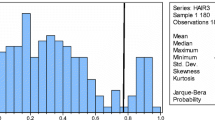Abstract
Cronyism provides policymakers with marked incentives to repay sovereign debt. This takes place at the expense of the average citizen who bears both steep costs of debt repudiation and high costs of debt service, as clientelism increases both financial fragility and the debt burden. The paper sets up a model of strategic debt default that nails down this point, with political distortions and where a representative agent can dismiss the government and overrule its decision. Economic hard times provide an opportunity to implement reforms fighting clientelism, as the implicit coalition between groups of cronies may break down. A model is built along these lines, which highlights cross-country contagion of debt repudiation.
Similar content being viewed by others
References
Calvo, Guillermo A. (1988) “Servicing the Public Debt: The Role of Expectations.“ American Economic Review 78:647–661.
Chang, Roberto (2003) “Financial Crises and Political Crises.“ Working Paper, Rutgers University, NJ.
Cole, Harold L. and Timothy J. Kehoe (1996) “A Self-Fulfilling Model of Mexico’s 1994–1995 Debt Crisis.“ Journal of International Economics 41:309–330.
Di Gioacchino, Debora, Sergio Ginebri, and Laura Sabani (2000) “Bribery and Public Debt Repudiation.“ Public Choice 105:303–321.
Drazen, Allan (1999) “What is Gained by Selectively Withholding Foreign Aid?“ Working Paper, University of Maryland.
Drazen, Allan (2000) “Political Contagion in Currency Crises.“ In P. Krugman (ed.), Currency Crises. Chicago: University of Chicago Press. Also, NBER Working Paper # 7211 (1998).
Drazen, Allan and Vittorio Grilli (1993) “The Benefits of Crises for Economic Reforms.“ American Economic Review 83:598–607.
Fisman, Raymond (2001) “Estimating the Value of Political Connections.“ American Economic Review 91:1095–1102.
Giannetti, Mariassunta (2003) “Bank-Firms Relationships and Contagious Banking Crises.“ Journal of Money, Credit and Banking 35:239–261.
Goldstein, Morris (1998) “The Asian Financial Crises: Causes, Cures and Systemic Implications.“ Policy Analyses in International Economics 55. Washington, D.C.: Institute for International Economics.
Gunter, Frank R. (1991) “Thomas Jefferson on the Repudiation of Public Debt.“ Constitutional Political Economy 2:283–301.
Haber, Stephen (2002) Crony Capitalism and Economic Growth in Latin America: Theory and Evidence. Stanford University, Hoover Institution Press Publication.
Haber, Stephen, Noel Maurer, and Armando Razo (2002) “Sustaining Economic Performance under Political Instability: Political Integration in Revolutionary Mexico.“ In Stephen Haber (ed.), Crony Capitalism and Economic Growth in Latin America: Theory and Evidence. Stanford University, Hoover Institution Press Publication.
Haslag, Joseph and Rowena Pecchenino (2004) “Crony Capitalism and Financial System Fragility.“ Economic Inquiry, forthcoming.
Keefer, Philip (2001) “When do Special Interests Run Rampant? Disentangling the Role of Elections, Incomplete Information and Checks and Balances in Banking Crises.“ World Bank Working Paper # 2543, Washington D.C.
Kodres, Laura E. and Matthew Pritsker (2002) “A Rational Expectations Model of Financial Contagion.“ The Journal of Finance 57:769–799.
Kremer, Michael and Seema Jayachandran (2002) “Odious Debt.“ Policy Brief #103, The Brookings Institution, Harvard University.
Kumar, Manmohan S. and Avinash Persaud (2002) “Pure Contagion and Investors’ Shifting Risk Appetite: Analytical Issues and Empirical Evidence.“ International Finance 5:401–436.
Navia, Patricio and Andrés Velasco (2002) “The Politics of Second Generation Reforms in Latin America.“ Working paper, Kennedy School of Government, Harvard University.
Obstfeld, Maurice (1994) “The Logic of Currency Crises.“ Cahiers Economiques et Monétaires, Banque de France 43:189–213.
Prakash, Aseem (2001) “The East Asian Crisis and the Globalization Discourse.“ Review of International Political Economy 8:119–146.
Robinson, James A. and Thierry Verdier (2002) “The Political Economy of Clientelism.“ CEPRDiscussion paper # 3205.
Tabellini, Guido (1991) “The Politics of Intergenerational Redistribution.“ Journal of Political Economy 99:335–357.
Tornell, Aaron (2002) “Economic Crises and Reform in Mexico.“ In Stephen Haber (ed.), Crony Capitalism and Economic Growth in Latin America: Theory and Evidence. Stanford University, Hoover Institution Press Publication.
Vaugirard, Victor E. (2004) “Informational Contagion of Sudden Stops in a Global Games Framework.“ Open Economies Review 15:169–192.
Velasco Andrés (1999) “A Model of Endogenous Fiscal Deficits, and Delayed Fiscal Reforms.“ In J. Poterba and J. von. Hagen (eds.), Fiscal Institutions and Fiscal Performance. Chicago: University of Chicago Press for the NBER.
Wei, Shang-Jin (2001) “Domestic Crony Capitalism and International Fickle Capital: Is There a Connection?“ International Finance 4:15–45.
Author information
Authors and Affiliations
Corresponding author
Additional information
JEL Classification Numbers: F3, E6, D8
Rights and permissions
About this article
Cite this article
Vaugirard, V. Crony Capitalism and Sovereign Default. Open Econ Rev 16, 77–99 (2005). https://doi.org/10.1007/s11079-005-5333-0
Issue Date:
DOI: https://doi.org/10.1007/s11079-005-5333-0




